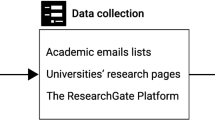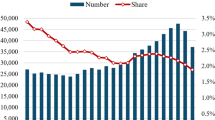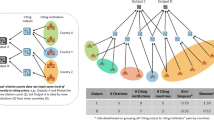Abstract
The global academic system is hierarchically structured between a center, a semi-periphery and a periphery. We analyze to what extent the position of a country and a university within this hierarchy of scientific reputation shapes doctoral students’ chances of international mobility. We conducted an exploratory experimental study using fake applications of international doctoral students sent to German sociology professors, who were asked to serve as supervisors during a planned research visit. Our fake applicants come from the core and periphery of the global academic system: Yale, Pennsylvania State University, National University Singapore, and Vietnam National University Hanoi. The results show that applicants from both US institutions get more positive and more personal feedback than the other applicants. This points to the importance of national scientific reputation. Moreover, we can show that universities’ symbolic capital seems to be more important than the quality of a department.
Similar content being viewed by others
Notes
We use the term “symbolic capital,” “reputation,” and “prestige” interchangeably in this study.
In Germany, according to data from 2014/15, around 81% of all doctoral students in the social sciences, law, and economics were not enrolled in structured doctoral programs (Statistisches Bundesamt 2016).
We are aware that a study looking at just four different universities cannot hope to depict the international system in all its complexity. Our study thus has an exploratory character.
It remains an open question how exactly the symbolic structure of the academic field relates to its material infrastructure, i.e., the distribution of economic resources, the diffusion rate of publications or the relationship to state power etc. Following Bourdieu, we assume that the two dimensions are largely interdependent, while displacements may occur, for example, when an institution manages to live on a reputation built up in the past.
Of course, as Simon Marginson highlights (2006), not all institutions of higher education are integrated into the global academic field to the same degree. He speaks of a segmentation between a “world market of elite universities” on the one hand, and lower-status national/local institutions on the other, who operate according to specific national field logics (Marginson 2006, p. 21). Nevertheless, national academic fields are increasingly restructured according to global competition dynamics.
According to the data provided by the Nobel Foundation, see www.nobelprize.org/nobel_prizes/lists/countries.html. Accessed 6 January 2017.
These conclusions may be wrong in individual cases. Statistical discrimination regularly occurs on labor markets that are characterized by asymmetric information about the applicants’ abilities and motivations (Spence 1973), or if decisions have to be taken quickly.
It is virtually impossible to measure differences in scholarly quality objectively. Thus, it is important to note that our argument here is not about “objective” differences between applicants, but about the relative reliability of different quality signals. We assume that a department’s reputation (according to whichever criteria) is probably a better predictor of a student’s scholarly ability than his or her university or country, given that the “margin of error” of the prediction is lower. A university might have some excellent departments that constitute its overall prestige, but a mediocre sociological department. Thus, using university affiliation as a predictor of sociological ability leads to a less reliable estimation of a student’s ability. This applies to our case in particular, since sociology professors should be most interested in reliably predicting the subject-specific (i.e., sociological) abilities of the applicants.
The selected countries cover important origin contexts for foreign students at German universities, see www.wissenschaftweltoffen.de/daten. Accessed 30 May 2016.
In the following: Yale, Penn State, NU Singapore, and VNU Hanoi.
Though not perfect, these rankings are the best available indicators of university reputation, as they rely largely on surveys among academics, combined with other indicators. In fact, these rankings even contribute to constituting hierarchies of reputation between universities (Münch 2014). We remain agnostic as to how well such rankings actually measure scholarly quality.
These names are among the most frequent Chinese surnames in Singapore (in 2000), see http://web.archive.org/web/20080223075738/http://www.singstat.gov.sg/pubn/papers/people/chinesesurnames.html. Accessed 30 May 30 2016.
The selection is based on the sociology programs listed by the German Sociological Association (DGS) www.studium.org/soziologie/suche/?q=&view=uni. Accessed 30 May 2016.
The German “junior professor” is equivalent to the North American “assistant professor.”
As fictitious applicants, we chose students that have not yet begun their doctoral studies, because those already enrolled in a doctoral program are usually listed on the university’s website and have an institutional email address. In the case of more advanced doctoral students, the absence of these signals of institutional affiliation could have raised the recipients’ suspicions. While this choice might have had a negative effect on the overall response rate, it did not bias the results, as it is unlikely that the absence of such signals of institutional affiliation interacts in any way with the treatment variables. Furthermore, German professors might not find such an early supervision request from an international student unusual, given that early planning of a research stay abroad is a common practice at German universities.
In Germany, “W1,” “W2,” and “W3 professors” refer to their salary band and are the equivalent of assistant, associate and full professors.
A note on the ethics of field experiments: We are aware that such an experiment breaches the requirement of informed consent when dealing with human subjects (the legal position in Germany is summarized by Klose and Kühn 2010). Therefore, it may only be conducted when there is no other way of generating the data, and under the condition that the potential damage for research participants is close to zero. Both applies to our case. Due to social desirability, the way respondents talk about discrimination will differ from what they actually do. Furthermore, our study does not inflict any damage on our subjects. First, we fully protect the anonymity of the professors included in this study. Second, their investment of time and other resources is minimal, since replying to an email takes no more than a couple of minutes. Third, by addressing university professors, we target a non-vulnerable group. We also argue that the results of our study might even have positive ethical consequences for the sociological community, by raising awareness among professors to make more informed selection decisions, and to rely less on unsubstantiated signals of symbolic capital.
An alternative coding of the informality and personal engagement evident in the response using the number of positive adjectives such as “great,” “interesting,” “happy,” or “open” confirms our results.
It is also possible that German professors address US students more often with their first name because they are aware that communication is more informal in the USA. However, as this indicator points in the same direction as the percentage of expressions of emotion and interest, we interpret it as showing a professor’s closer engagement with the applicant.
English translation: You are welcome to answer in German as I made my minor in German. I understand it quite well although speaking is still difficult. Best regards, XY
References
Baldi, S. (1995). Prestige determinants of first academic job for new sociology Ph.D.s 1985-1992. The Sociological Quarterly, 36(4), 777–789.
Becker, G. S. (1971). The economics of discrimination. Chicago & London: University of Chicago Press.
Bedeian, A. G., Cavazos, D. E., Hunt, J., & Jauch, L. R. (2010). Doctoral degree prestige and the academic marketplace: a study of career mobility within the management discipline. Academy of Management Learning & Education, 9(1), 11–25.
Bourdieu, P. (1984). Distinction: a social critique of the judgement of taste. Harvard: Harvard University Press.
Bourdieu, P. (1988). Homo academicus. Stanford: Stanford University Press.
Bourdieu, P. (1989). Social space and symbolic power. Sociological Theory, 7(1), 14–25.
Bourdieu, P. (1996). The state nobility: elite schools in the field of power. Stanford: Stanford University Press.
Brewer, D. J., Eide, E. R., & Ehrenberg, R. G. (1999). Does it pay to attend an elite private college? Cross-cohort evidence on the effects of college type on earnings. The Journal of Human Resources, 34(1), 104–123.
Burris, V. (2004). The academic caste system: prestige hierarchies in PhD exchange networks. American Sociological Review, 69(2), 239–264.
Chase-Dunn, C., & Grimes, P. (1995). World-systems analysis. Annual Review of Sociology, 21, 387–417.
Chen, T. M., & Barnett, G. A. (2000). Research on international student flows from a macro perspective: a network analysis of 1985, 1989 and 1995. Higher Education, 39, 435–453.
Chevalier, A., & Conlon, G. (2003). Does it pay to attend a prestigious university? IZA discussion paper no. 848. Bonn: Institute for the Study of Labor.
Clauset, A., Arbesman, S., & Larremore, D. B. (2015). Systematic inequality and hierarchy in faculty hiring networks. Science Advances, 1(1), 1–6.
DAAD (German Academic Exchange Service). (2016). Facts and figures on the international nature of studies and research in Germany. Bielefeld: Bertelsmann.
Diekmann, A., & Preisendörfer, P. (2003). Green and greenback: the behavioral effects of environmental attitudes in low-cost and high-cost situations. Rationality and Society, 15(4), 441–472.
Eide, E. R., Brewer, D. J., & Ehrenberg, R. G. (1998). Does it pay to attend an elite private college? Evidence on the effects of undergraduate college quality on graduate school attendance. Economics of Education Review, 17(4), 371–376.
Findlay, A. M., King, R., Smith, F. M., Geddes, A., & Skeldon, R. (2012). World class? An investigation of globalisation, difference and international student mobility. Transactions of the Institute of British Geographers, 37(1), 118–131.
Gerber, T. P., & Cheung, S. Y. (2008). Horizontal stratification in postsecondary education: forms, explanations, and implications. Annual Review of Sociology, 34, 299–318.
Gigerenzer, G., Todd, P. M., & the ABC Research Group. (1999). Simple heuristics that make us smart. Oxford: Oxford University Press.
Hartmann, M. (2007). Eliten und Macht in Europa: Ein internationaler Vergleich. Campus: Frankfurt a. M./New York.
Headworth, S., & Freese, J. (2016). Credential privilege or cumulative advantage? Prestige, productivity, and placement in the academic sociology job market. Social Forces, 94(3), 1257–1282.
Heilbron, J. (2014). The social sciences as an emerging global field. Current Sociology, 62(5), 685–703.
Jöns, H., & Hoyler, M. (2013). Global geographies of higher education: the perspective of world university rankings. Geoforum, 46, 45–59.
Kehm, B. M. (2014). Global university rankings—impacts and unintended side effects. European Journal of Education, 49(1), 102–112.
Klose, A., & Kühn, K. (2010). Die Anwendbarkeit von Testing-Verfahren im Rahmen der Beweislast, § 22 Allgemeines Gleichbehandlungsgesetz. Berlin: Antidiskriminierungsstelle des Bundes.
Lee, S., & Brinton, M. C. (1996). Elite education and social capital: the case of South Korea. Sociology of Education, 69(3), 177–192.
Marginson, S. (2006). Dynamics of national and global competition in higher education. Higher Education, 52(1), 1–39.
Marginson, S. (2008). Global field and global imagining: Bourdieu and worldwide higher education. British Journal of Sociology of Education, 29(3), 303–315.
Merton, R. K. (1949). Science and democratic social structure. In R. K. Merton (Ed.), Social theory and social structure. Toward the codification of theory and research (pp. 307–316). Glencoe: Free Press.
Mosbah-Natanson, S., & Gingras, Y. (2014). The globalization of social sciences? Evidence from a quantitative analysis of 30 years of production, collaboration and citations in the social sciences (1980-2009). Current Sociology, 62(5), 626–646.
Münch, R. (2014). Academic capitalism: universities in the global struggle for excellence. New York & London: Routledge.
Phelps, E. S. (1972). The statistical theory of racism and sexism. American Economic Review, 62(4), 659–661.
Rivera, L. A. (2011). Ivies, extracurriculars, and exclusion: elite employers’ use of educational credentials. Research in Social Stratification and Mobility, 29(1), 71–90.
Rivera, L. A. (2012). Hiring as cultural matching. The case of elite professional service firms. American Sociological Review, 77(6), 999–1022.
Schott, T. (1998). Ties between center and periphery in the scientific world-system: accumulation of rewards, dominance and self-reliance in the center. Journal of World-Systems Research, 4(2), 112–144.
Sklair, L. (2001). The transnational capitalist class. Oxford & Malden: Blackwell.
Spence, M. (1973). Job market signaling. The Quarterly Journal of Economics, 87(3), 355–374.
Statistisches Bundesamt. (2016). Promovierende in Deutschland. Wintersemester 2014/2015. Wiesbaden: Statistisches Bundesamt.
UNESCO (2014). Global flow of tertiary-level students. www.uis.unesco.org/Education/Pages/international-student-flow-viz.aspx. Accessed 31 May 2016.
Useem, M., & Karabel, J. (1986). Pathways to top corporate management. American Sociological Review, 51(2), 184–200.
Acknowledgements
The paper is a revised version of an article published in German.
Funding
The study was carried out in the context of the project “Transnational Human Capital and Social Inequality” funded by the German Research Foundation (DFG).
Author information
Authors and Affiliations
Corresponding author
Appendices
Appendix I Letter of request
Subject: Yale/Penn State/NU Singapore/NU Vietnam PhD student seeks academic mentor in Germany Email: XY@gmail.com |
Dear Professor A: I hope this message finds you well. My name is XY, and I was recently accepted to the PhD Program in Sociology at Yale University/Pennsylvania State University/National University of Singapore/Vietnam National University. My program offers me funding to spend a year abroad, and I am planning to come to Germany during the 2016-17 academic year to work on my dissertation. Although it is still quite early, I would already like to reach out to you, as I am looking for an academic mentor to support me during my stay in Germany. I have read a number of your publications, and your research profile fits perfectly with my own first dissertation ideas. If mentoring me is something you would possibly be open to considering, that would be wonderful. I would be happy to provide you with further information about myself and my dissertation plans. Sie könnten mir auch gerne in Deutsch antworten, weil ich habe mein Minor in Deutsch gemacht. Ich verstehe es ganz gut, auch wenn sprechen noch schwierig geht. Footnote 20 Viele Grüße XY |
Appendix II Multivariate analysis
Rights and permissions
About this article
Cite this article
Gerhards, J., Hans, S. & Drewski, D. Global inequality in the academic system: effects of national and university symbolic capital on international academic mobility. High Educ 76, 669–685 (2018). https://doi.org/10.1007/s10734-018-0231-8
Published:
Issue Date:
DOI: https://doi.org/10.1007/s10734-018-0231-8




